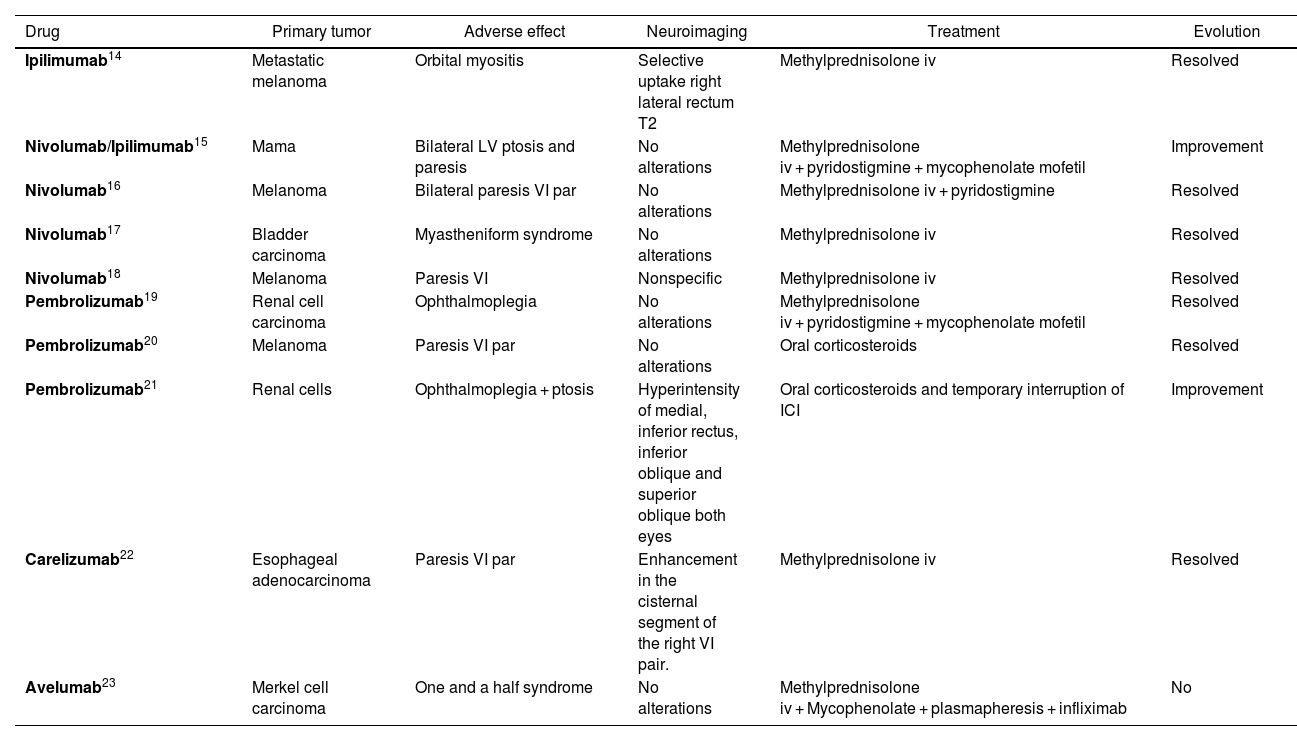Cancer therapy relies on new antitumoral drugs called immune checkpoint inhibitors (ICI), which produce long-lasting anti-tumor responses and lengthen survival, but cause autoimmune-type toxicity. The clinical characteristics induced by ICI are not well characterized to date and careful collection of clinical data is required to accurately define its safety profile.
We conducted a literature search in the main clinical search engines to identify pharmacological ocular iatrogenic events of ICIs related to ocular motility. Four systematic reviews were found that included this type of ocular iatrogenesis as well as numerous isolated case reports. Reported adverse effects include: oculomotor paresis, optic neuropathy, optic atrophy, myastheniform syndromes, thyroid pseudo-orbitopathy, orbital apex syndrome, and hypophysitis. Most were managed without interruption or with partial interruption of cancer treatment. Aggressive systemic treatments were required for adequate management of ocular iatrogenic events.
It is essential that the ophthalmologist become familiar with the new ICI oncological treatments, capable of causing severe and disabling motilidad ocular iatrogenesis for the patient. The communication of adverse effects and the report of the treatments used can help the most appropriate management of these patients. Research should be oriented towards complex differential diagnosis and to optimize decisions on cancer treatments.
La terapia contra el cáncer cuenta con los nuevos inhibidores de puntos de fijación (ICI), que producen respuestas antitumorales duraderas y alargan la supervivencia pero provocan toxicidad de tipo autoinmune. Las características clínicas inducidas por ICI no están bien caracterizadas hasta la fecha y se requiere una cuidadosa recogida de datos clínicos que permitan definir con precisión su perfil de seguridad.
Realizamos una búsqueda en la literatura en los principales buscadores clínicos para identificar iatrogenia farmacológica de los ICI relacionada con la motilidad ocular.
Se encontraron 4 revisiones sistemáticas que incluían este tipo de iatrogenia ocular, así como numerosos reportes de casos aislados. Los efectos adversos reportados comprenden: paresias oculomotoras, neuropatía óptica, atrofia óptica, síndromes miasteniformes, pseudo-orbitopatía tiroidea, síndrome del ápex orbitario e hipofisitis. La mayoría se manejaron sin interrupción o con interrupción parcial del tratamiento oncológico. Se requirieron tratamientos sistémicos agresivos para el manejo adecuado de la iatrogenia ocular.
Es imprescindible que el oftalmólogo se familiarice con los nuevos tratamientos oncológicos ICI, capaces de provocar iatrogenia sobre la motilidad ocular grave e incapacitante para el paciente. La comunicación de efectos adversos con los tratamientos empleados puede ayudar al manejo más adecuado de estos pacientes. La investigación debe ir orientada al diagnóstico diferencial complejo y a optimizar las decisiones sobre los tratamientos oncológicos.











